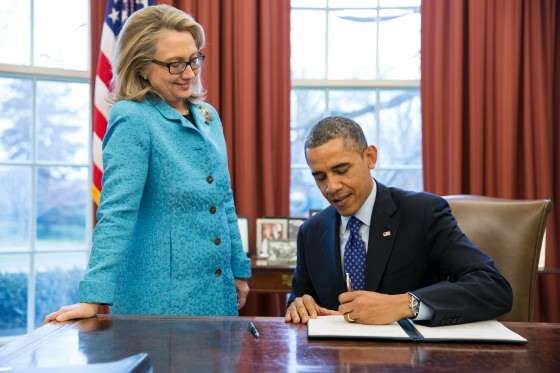Clinton Leads Potential GOP Contenders in Early 2016 Polling

We're still six months away from this year's midterm election. But that doesn't mean it's too early to start polling the public about potential presidential candidates for the 2016 race.
A McClatchy-Marist poll released yesterday did just that, and the findings are stark but not surprising: Hillary Clinton has a significant lead over any potential Republican challenger.
The former secretary of state rolled up support from majorities of voters when pitted against eight different Republicans. Though Clinton isn't saying whether she'll seek the White House, her supporters have been raising money and promoting her candidacy.
The race for the Republican nomination is a free-for-all, with five possible contenders in a virtual tie. Gov. Chris Christie of New Jersey, who was virtually deadlocked with Clinton as recently as December, has regained some political strength after stumbling early this year but remains far behind the Democrat.
"Hillary Clinton is jogging around the track by herself as far as the Democratic field is concerned. Republicans are all in the starting blocks," said Lee Miringoff, the director of the Marist Institute for Public Opinion in New York, which conducted the poll last week.
Like I said, it's not too early to start polling the contenders. But it is far too early to make much of the results. Presidential polls as this very early stage have essentially no predictive power regarding the final outcome.
Mostly what this tells us, then, is that with more than two years to go, Hillary Clinton, a former Secretary of State, U.S. Senator, and First Lady who is widely expected to be the eventual Democratic nominee and ran for the Democratic nomination once before, has much better name recognition than any potential GOP rival at this point. Notably, Rep. Paul Ryan (R-Wisc.), who served as the GOP's VP nominee in 2012, fares the best against Clinton.
But it does suggest one looming challenge for Republicans. Clinton may not go totally uncontested, but if she runs for the nomination, she'll likely win without a whole lot of effort. That gives her a tremendous early advantage: She won't have to go through any rough primary battles, won't have to spend much money fighting party rivals, have to make a name for herself with the public. Republicans, by contrast, will have to work to win over the party's base, establish themselves with the larger electorate, and avoid the sort of intramural squabbling that could drag everyone down.
The upsides for Republicans are that Hillary Clinton's reputation is already pretty well established, and that she won't be able to deviate too much from the Obama administration's policies or priorities. So if it turns out that voters want something different at that point, she'll have a hard time changing how they view her.


Show Comments (94)